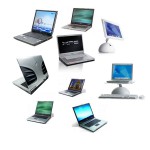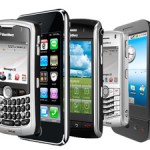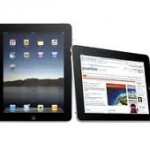LOOKING TO BUY A NEW COMPUTER? YOU MIGHT WANT TO WAIT
 There are plenty of reasons for buying a new computer, especially if your current one is older, slow and in constant need of maintenance.
There are plenty of reasons for buying a new computer, especially if your current one is older, slow and in constant need of maintenance.
However, if your only reason is to get the “latest and greatest,” you might want to consider waiting. In his column in the Wall Street Journal this week, http://on.wsj.com/IBxfzr, Walter Mossberg presents his argument for waiting, unless it is absolutely necessary to replace your existing equipment.
Both Microsoft and Apple will be introducing new operating systems within the next few months, and while there might be some excellent deals available now, the preliminary news on the changes indicate that it might be worth waiting.
So, if your incentive to buy is because your existing computer has slowed down, your equipment might just need a maintenance checkup.
If you need advice on whether you should be scheduling a checkup, or any other technology issues, do not hesitate to contact me at 917 921-4518 or by e-mail at jblue@bluetutor.com. Feel free to click here to receive my free white paper on Technology Tips on setting up a home office and becoming a true road warrior.
WHAT TOOLS DO YOU NEED TO COMPETE IN THE DIGITAL AGE?
 This century will clearly be remembered as The Age of Technology. Wireless technology permits us to communicate with friends, family and business associates instantaneously, regardless of location. Information is no more than a key stroke away, whether from your computer or mobile device. Skills acquired in the past century alone put you on the wrong side of the Great Digital Divide. Today’s younger generation, having grown up in the digital world, is well positioned to push baby boomers and seniors aside as they enter the job market.
This century will clearly be remembered as The Age of Technology. Wireless technology permits us to communicate with friends, family and business associates instantaneously, regardless of location. Information is no more than a key stroke away, whether from your computer or mobile device. Skills acquired in the past century alone put you on the wrong side of the Great Digital Divide. Today’s younger generation, having grown up in the digital world, is well positioned to push baby boomers and seniors aside as they enter the job market.
How are your basic computer skills? Whether you use technology for strictly personal use or for professional purposes, you will need the right tools to take advantage of the many changes that have occurred in the worlds of communication and information gathering.
The following are some basic questions you should be asking yourself.
– Whether you use your home based computer for personal or professional purposes, are you comfortable with the software applications you are using?
– Are you able to write, format and properly file documents?
– How about sending and receiving attachments?
– Do you know what updates are important?
– Do you have an active anti-virus program?
– Do you have a backup program?
– Is your wireless network secure?
– Do you have the right cell phone provider for your location?
– Have you upgraded to a smartphone? (iPhone, Android, or blackberry)
– Are you using any cloud based services?
We are living in a mobile world. Within the next 2-3 years, over 50% of Internet access will be done through a mobile device. Are you ready?
If you or someone you know needs help crossing the “Great Digital Divide,” or any other technology issues, do not hesitate to contact me at 917 921-4518 or by e-mail at jblue@bluetutor.com. Feel free to click here to receive my free white paper on Technology Tips on setting up a home office and becoming a true road warrior.
7 KEY PASSWORD RULES
How often do you change your passwords?
![]() More than likely, you are using a number of different passwords to access your e-mail account, bank accounts, financial institutions as well as sites like Amazon, ebay, etc. The security of your sites is predicated on the strength of your passwords as well as your ability to keep them private. Here are some simple rules to follow:
More than likely, you are using a number of different passwords to access your e-mail account, bank accounts, financial institutions as well as sites like Amazon, ebay, etc. The security of your sites is predicated on the strength of your passwords as well as your ability to keep them private. Here are some simple rules to follow:
1. All passwords should be changed at least every 6 months
2. Never use names of family members, birthdays, anniversaries, or any other easily “guessed” passwords.
3. Do not use the same password for all your sites
4. While it is critical not to divulge any personal information requested in an e-mail (including your bank), it is especially important not to give out password information and respond to requests to change passwords.
5. When creating a password, it is best to use a combination of numbers, letters and symbols. Again, do not use the same password for all your accounts.
6. Do not list your passwords on a document that is stored in your computer or smartphone. Your files in your computer can easily be accessed by anyone using your computer, particularly if it is part of a network.
7. And finally, be careful whom you share password information with.
If you have any questions about passwords or any other technology issue, you can contact me at 917 921-4518 or by email at jblue@bluetutor.com.
SUMMER’S OVER, TIME TO REASSESS YOUR TECHNOLOGY NEEDS
The world of technology changes constantly. Quite a bit has happened during the past few months, and now that the summer is over, here are some important things to consider to make sure your technology supports your needs:
1. When’s the last time your computer had a checkup? Is it running slowly? Is your anti-virus program up to date?
2. Are you considering an upgrade? Are you undecided on what type of computer to purchase – Windows or MAC? Should you be considering a tablet (iPad, etc.)?
3. Is your cell phone eligible for an upgrade? Do you have a smartphone (blackberry, iphone, android) for the road? Are you sure you are using the best provider (Verizon, AT&T, Sprint, etc.) for your needs?
If you have any questions about these or any other technology issues, you can contact me at 917 921-4518 or by e-mail at jblue@bluetutor.com.
If you have not already done so, you may download a copy of my FREE white paper on technology tips for setting up a home office and operating in the mobile world by clicking HERE or by going to my website at www.bluetutor.com
CONFUSED BY YOUR CELL PHONE BILL?
What is a Tiered Data Plan?
 Recently released statistics (as reported by CNN.com) indicate that more than a third of U.S. adults now own smartphones. The Nielsen Company reports that smartphones represent over 50% of all new cell phone purchases.
Recently released statistics (as reported by CNN.com) indicate that more than a third of U.S. adults now own smartphones. The Nielsen Company reports that smartphones represent over 50% of all new cell phone purchases.
By definition, a smartphone is any mobile device that combines functions such as telephone, e-mail, Internet access, contact information, and calendar. The three major suppliers of smartphones are Apple’s I-Phone, RIM’s Blackberry, and Google’s Android.
Cell phone providers (Verizon, AT&T, Sprint, etc.) offer a variety of telephone plans based on your usage. While the telephone plans are the same for smartphones, there is an additional charge for “data,” meaning e-mail and Internet access. These charges add an additional $30 and up to your bill.
Several weeks ago, following the lead of its competitors, Verizon ended its “unlimited” data plan and introduced “tiered” pricing. The end of the unlimited era has confused many consumers who do not understand the new pricing structure which is based on the amount of data usage. Verizon now offers monthly plans of $30 for 2GB of data, $50 for 5GB of data and $80 for 10GB of data. Additional fees will apply if you exceed the limits of your plan.
In order to determine what plan is best for you, below is a list of functions that will impact your data usage.
1. Streaming video – Watching video on programs such as YouTube or full length movies on services like Netflix and Hulu on your smartphone or I-Pad.
2. Streaming Audio – While it is OK to play music from your I-Tunes library, using Internet Radio programs such as Pandora eats into your usage (although not as much as video).
3. Navigation systems – Using your smartphone on the road as opposed to an in-car navigation system.
4. Internet Use – Sites with significant amounts of data.
Accessing social media sites such as Facebook will not consume a lot of megabytes. However uploading photos will. Twitter is fine since it deals mainly with small amounts of text. No need to worry about e-mail, since it is basically plain text. However, if you receive attachments with high resolution pictures, your usage will increase.
An alternative to using your cell phone provider’s data service is using Wi-fi wherever it is available, whether that be at home, in your office or a “hotspot.” There are no data limitations with a wi-fi connection.
As for me, I am on the road quite a bit and use my smartphone all day. An analysis of my usage indicates that I am well under 2GB per month, which should be more than sufficient for the average mobile warrior. I suggest you check with your service provider who is able to provide you with an analysis of your usage prior to selecting a pricing package.
If you have any questions about your cell phone situation, want to discuss a possible upgrade, or any other technology issues, give me a call at 917 921-4518 or send an email to jblue@bluetutor.com.
Click HERE to join my mailing list and receive my FREE whitepaper on setting up a home office and becoming a true road warrior.
10 REASONS YOU MUST HAVE A BACKUP SYSTEM

You’ve recently left corporate life, set up a home office or started a new business. Your documents, pictures, music, videos, etc, that are stored in your computer are important to you. Do you have a backup system? Here are some reasons you should be backing up your data.
1. What if your computer crashes and you can’t start it.
2. Your home/office burns down
3. Your computer has been stolen
4. You left the computer in a restaurant, hotel, etc.
5. Coffee, soda or other liquid has been spilled on the keyboard of your laptop
6. The computer has been dropped
7. A virus has wiped out the hard drive
8. Malware, short for malicious software, has permitted someone to infiltrate your computer system without your consent
9. You have inadvertently erased an important file.
10. Someone else who uses your computer has deleted files
The list goes on. Before disaster strikes, make sure you are backing up ALL your important data onto an external hard drive and explore many of the online backup options that are available.
If you have any questions about what method of backup is best for you, do not hesitate to contact me.
10 REASONS WHY COMPANIES SHOULD TARGET BABY BOOMERS
Baby Boomers are not Luddites!
 1. Baby Boomers number 77 million, over 25% of the US population.
1. Baby Boomers number 77 million, over 25% of the US population.
2. Baby Boomers are the wealthiest, best educated and most sophisticated purchasers of services and products.
3. By 2030, there will be twice as many people over age 65 as now. Companies that don’t make their products and services relevant to older consumers will have a difficult time.
4. The latest research indicates that Boomers and Seniors are expected to outspend younger adults by $1 trillion this year.
5. The latest statistics indicate that 41% of Boomers regularly visit social networking sites such as Facebook and LinkedIn, and 61% visit websites that offer streaming or downloadable videos.
5. A recent article in the NY Times reported that Boomers show a great deal of interest in purchasing consumer electronics – more than any other age group.
6. There is a surging number of people starting businesses later in life (baby boomers and seniors). They will rely heavily on technology and will need to brush up on their basic computer skills.
7. Boomers embrace technology when researching travel, products and services.
8. With families spread out all over the world, they will rely heavily on e-mail, social media and video conference to keep in touch.
9. Boomers don’t want technology products that are complicated and cluttered with excessive features.
10. Remember, Boomers are not just interested in issues such as health care and senior living facilities. They spend more on traveling, new cars and computers than any other generation.
Are you a “Mobile Warrior?”
7 Tips for the frequent traveler
 1. Are you using a “smartphone? Upgrading your standard cell phone to either an I-Phone, Blackberry or Android will permit you to communicate by e-mail, text message and depending on the type of mobile device, be able to video chat as well on the go.
1. Are you using a “smartphone? Upgrading your standard cell phone to either an I-Phone, Blackberry or Android will permit you to communicate by e-mail, text message and depending on the type of mobile device, be able to video chat as well on the go.
2. Will you need to travel with a computer? If you are involved with a lot of project work that requires you to use word processing, etc., having a light weight laptop will be necessary. However, if your needs only involve checking your e-mail, accessing your contact and calendar information, and browsing the Internet, you might want to consider a tablet such as the I-Pad. The tablet market has become a popular tool for travelers. (Check my blog from April 12th on the pros and cons of the I-Pad).
3. When booking hotels, make sure that they provide Internet access. Most major hotels offer wireless connectivity. Some hotels charge extra for Internet use.
4. While you will find many places such as hotels, coffee shops, Internet cafes, parks and airports offering either paid or free Internet access, more than likely the network is not secured. Do not enter any private information such as bank passwords, social security numbers, etc. from these locations since your information is on a “public” network. Starbucks is a great place to get work done, however when accessing the Internet, you are using the same network as the person at the table next to you, much like sharing a wireless connection with someone else at home.
5. If you are planning to travel abroad, check with your mobile provider (Verizon, AT&T, Sprint, etc.) to determine if your mobile device can be used out of the US and what your charges will be for calling and data services (e-mail, texting, and Internet access). It might be more cost efficient for you to rent a phone for use in the country you are traveling to.
6. There are a host of services available to minimize your communication costs when traveling abroad. Skype is good for calling and video chatting computer to computer (some mobile devices will permit Skype to Skype calls). MAC computers have I-Chat.
7. Don’t forget your chargers and adapters (and voltage specs) if traveling abroad.
If you have any questions about becoming an efficient “Mobile Warrior,” do not hesitate to contact me.
5 KEY RULES FOR THE USE OF CELL PHONES ABROAD
 1. Check with your mobile phone provider (Verizon, AT&T, Sprint, etc.) to see if your phone will work in the country you are visiting.
1. Check with your mobile phone provider (Verizon, AT&T, Sprint, etc.) to see if your phone will work in the country you are visiting.
2. Make sure that you tell your provider that you are traveling internationally. Some offer international data plans (e-mail, Internet access, messenger services).
3. Some mobile providers are placing limits on “unlimited plans.” Make sure you understand how you will be billed.
4. Inquire whether your phone can use a SIM card. SIM cards are small removable smart cards that are used in many cell phones. These cards are used to store your mobile phone number and address book contacts. Not all phones can use SIM cards so contact your service provider.
5. Since placing and receiving calls on your phone while overseas is expensive, you might want to consider renting a local phone for the country or countries who are visiting. These phones can be rented in the US before you leave.
Below is a link to an article that appeared in today’s Wall Street Journal with some excellent suggestions on how to save money while abroad.
If you have any questions about how to control your communication costs abroad, do not hesitate to contact me at 917 921-4518 or by e-mail at jblue@bluetutor.com.
7 REASONS FOR A BABY BOOMER TO GET AN I-PAD
 Baby boomers are the wealthiest, best educated and most sophisticated purchasers of services and products. This generation has substantial disposable resources to spend and invest. Boomers don’t want technology products that are complicated. The I-Pad is the perfect answer to the 50+ age group whose primary interest is in obtaining information, reading books and keeping in touch (e-mail).
Baby boomers are the wealthiest, best educated and most sophisticated purchasers of services and products. This generation has substantial disposable resources to spend and invest. Boomers don’t want technology products that are complicated. The I-Pad is the perfect answer to the 50+ age group whose primary interest is in obtaining information, reading books and keeping in touch (e-mail).
The following are the top reasons for this age group to purchase an I-Pad.
1. Portability – Smaller and lighter than a computer, it can easily be carried in a briefcase or pocketbook.
2. Larger Screen – Much easier to read.
3. Ease of Use – One touch away from your favorite news services, stock reports, restaurant reviews, movie schedule, etc.
4. Long battery life – Significantly longer than a computer
5. Mobile Internet Access – Ability to browse the Internet from the car, train, beach, etc.
6. Immediate Start-up – Slide the button on top to turn it on for instant access.
7. Maintenance Free – Made by Apple! Little or no technical issues
